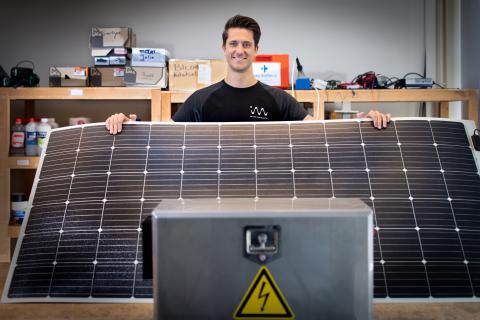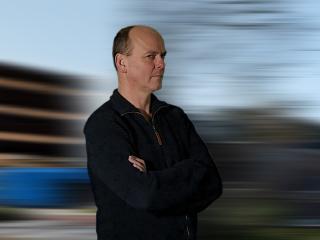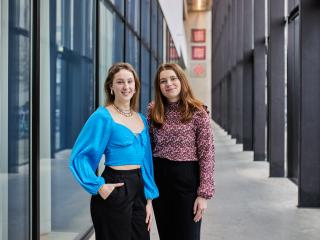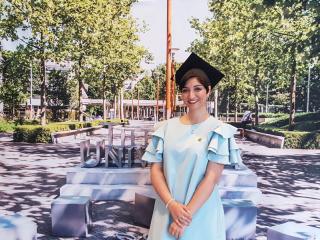‘We feel a bit like explorers’
Entrepreneurship entails a lot of positive things such as the satisfaction of achievement and pride, but it isn’t all rainbows and unicorns. Alumnus Martijn Ildiz knows all about it. For ten years now, he has been running his own business, IM Efficiency, producing solar panels for trucks and trailers. Things are moving in the right direction, but not without Martijn having learnt some important lessons the hard way. ‘Being an entrepreneur is the best way to be very boring and unsociable at parties, because you can talk about everything and you also know a lot about everything. That can be pretty irritating for the other guests.’
The year is 2014. Martijn Ildiz is on top of a building looking down at the traffic below. He is an International Business Administration student and his hobbies are motorsport and freerunning. The latter activity takes him running, climbing, and jumping from roof to roof. In doing so, he must be increasingly careful to avoid the growing number of solar panels. While he is taking in the view below, he experiences what he will later refer to as a Eureka moment. ‘I saw those trucks driving past and suddenly wondered why there were no solar panels on the roofs. A trailer or semi-trailer has an average length of thirteen meters. That’s a lot of surface to generate power on.’ He works out the idea together with a friend. ‘It grabbed us and we couldn’t get it out of our minds. And before you know it, you are ten years down the road.’
Martijn: ‘I already owned a small business that funded my motorsport activities. That sparked more enthusiasm in me than all the internships I had done. I did not want to work for someone else; I wanted to be my own boss. I think I inherited that entrepreneurial spirit from my mother. She used to have a shop of her own and there are a lot of entrepreneurs on her side of the family. As a boy I already tried to earn a bit of money. I used to go knocking on doors and offering to do jobs.
After high school, I wasn’t sure what I wanted to do. I was interested in so many things. I wanted to do something technical, but I didn’t see myself as an engineer. And I was also interested in economic subjects. The International Business Administration program provided many different options. But to be honest, I wasn’t a very 'active' student. I wasn’t cut out for a rigid school-like system of going to lectures and submitting assignments. Nowadays much attention is paid to entrepreneurship and start-ups within the program. That wasn’t the case in my time, but maybe I didn’t take enough trouble to seek connection. In 2016, I graduated from my Bachelor’s. IM Efficiency was doing quite well already.’

Centuries ago, people explored the world and then the universe. Our generation is exploring energy sources and is actively working on the energy transition.
Green ideals
‘No, I wasn’t driven by green ideals. I had never been exposed to any, really. Not in high school, not at home, not even later at university. I actually didn’t begin looking into the climate crisis until we started developing our idea. I was more inspired by innovation and the fact that we were in unchartered territory. There was so much to be designed and manufactured. There still is. We feel a bit like explorers. Centuries ago, people explored the world and then the universe. Our generation is exploring energy sources and is actively working on the energy transition.
We were quite naive when we started. You read so many success stories on the social media that you think you can be a multimillionaire in six months, too. We started by setting up a limited liability company. Our solicitor said: ‘You had better not put all your eggs in one basket.’ So we said: ‘Let’s have two then.’ The second step was writing a patent application. All our private funds went into this procedure. That was an expensive lesson because it was the worst patent application I had ever seen. We withdrew it immediately. We thought that if we consulted an expensive law firm, everything would be all right. But because the technology had not been developed far enough, the patent was incomplete and therefore not watertight. With these lessons in mind, we wrote a new patent in 2017 and that turned out all right.
What this experience taught us is: when you become an entrepreneur, you need to know a lot about all sorts of things. In fact preferably everything of everything, because then you have a better chance that things will go well. I personally think that being an entrepreneur is the best way to be very boring and unsociable at parties, because you can talk about everything and anything and you also know a lot about everything. That can be pretty irritating for the other guests.’
Furthermore, it was a matter of not taking any salary for yourself. That was one of the reasons why I moved back in with my parents at the time.
SolarOnTop
‘Meanwhile we continued to develop our idea. We called our product SolarOnTop. The idea: with solar panels on the roof of their trailers, drivers can generate enough electricity for the electric equipment in their truck cab. Truck drivers typically idle their engines for this purpose, which costs fuel and produces CO2 emissions. The SolarOnTop saves about 5.5 percent on fuel. On an annual basis, that is approximately 2000 liters of diesel fuel per truck and an amount of CO2 emissions equal to that produced by two to three passenger cars. The break-even period is around three years.’
In 2016, IM Efficiency received a € 45,000 subsidy. This allowed Martijn and his partners to build a prototype and demonstrate with tests that their idea was electrotechnically feasible. All in all it wasn’t until 2020 before the first investors showed interest.
‘Across the board, investors are more attracted to startups that do something software-related. We are in hardware, a line of business where innovation in the field of automotive, battery technology, solar technology, and power electronics converge. We made it through that first phase thanks to subsidies and the Rabobank innovation loan. All funding we obtained went into the technology aspect. Furthermore, it was a matter of not taking any salary for yourself. That was one of the reasons why I moved back in with my parents at the time. I didn’t mind that at all: I formed a special bond with them as a result. My co-founders already had careers and were in a different financial situation. That made a difference. If everyone in the organization is on a tight rein, it’s tough going.’
When you wake up in the morning and all you want to do is work on your product, then you adapt automatically
Sacrifice
‘A sacrifice? Well, I had no option, really. It just happened. When you wake up in the morning and all you want to do is work on your product, then you adapt automatically. On holidays, I was making electrical drawings, simply because I want it to work, not because I had to. I hardly think of it as work.
I am now totally convinced of the need for green solutions. However, I also believe that green solutions must be realistic and affordable. That is the basis on which I take my decisions. People rolling in dosh can put tons of solar panels on their roofs, but how do we make it affordable for Average Joe? People are motivated by money. Carriers really want to become more sustainable, but they operate on very slim profit margins, so they look critically at their business case.’
In first instance, IM Efficiency concentrated on lower fuel consumption through the use of solar panels, but now Martijn and his team focus rather on energy security and reliability. ‘On the one hand, carriers are instructed to reduce CO2 emissions but, on the other hand, it is becoming increasingly difficult for companies to obtain electricity from the regular energy grid. Companies sometimes cannot even get a new power grid connection. If you need to charge your whole fleet of trucks, you do have a problem. We are part of the solution. With our technology, trucks can increase their range by 5 to 15%. In addition, we want to use trailers like a kind of mobile solar parks. Articulated trucks consist of a tractor and a trailer. Tractors take a trailer full of cargo to its destination and then continue on their way. That trailer has been charged while it was underway. You can use that energy to support the local power grid.’
Our present focus is on trucks but in principle you can stick our light-weight solar cells on anything, also on the spokes of your e-bike
Roadmap
‘Many of the ideas we are elaborating now were already dreamed up in the early years. But you cannot tackle everything all at once. We have taken the time to listen carefully to the needs of carriers and of course we spent some time in the trucks ourselves. At a certain point, you start to see the connections, which helps you to think of even more and better solutions.
In 2023, we sold more than a hundred SolarOnTop systems. In 2024, we will fit out all new trailers of bpost, the Belgian postal service. That’s the phase we are currently in. As part of our roadmap for the medium term, we will also be looking at different applications and markets. Our present focus is on trucks but in principle you can stick our light-weight solar cells on anything, also on the spokes of your e-bike. We believe that it is better to generate energy locally than to store and transport it.’
Alumni Startup Night
Martijn Ildiz is one of the speakers at Alumni Startup Night: Climate and Energy Transition, on March 28. He also attended last year. ‘I was overwhelmed by that big hall full of people. I had prepared a personal story, in which I said that being an entrepreneur isn’t all rainbows and unicorns. That story proved to resonate with many people in the audience. We are always positive about entrepreneurship, but sometimes it is tough. My message was: Stick to what you are doing because, at some point, it will all come your way. If you are future-oriented, you will get the opportunity to apply your ideas. The longer you work on your ideas, the better your chances are because you will have more knowledge. And that unique knowledge is a reason for investors to team up with a startup.'
Date of publication: 28 February 2024



